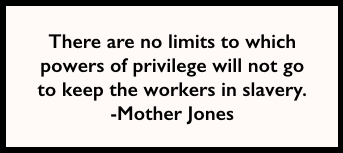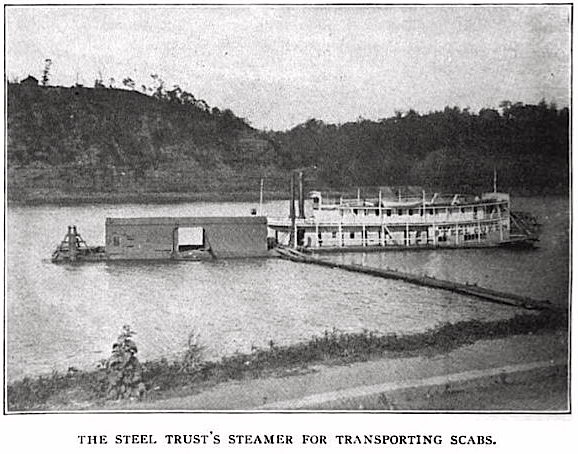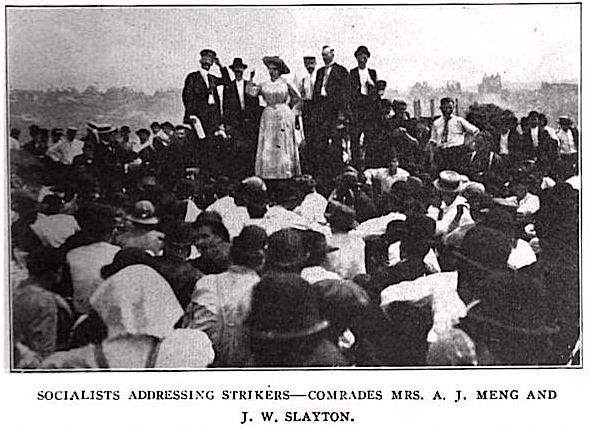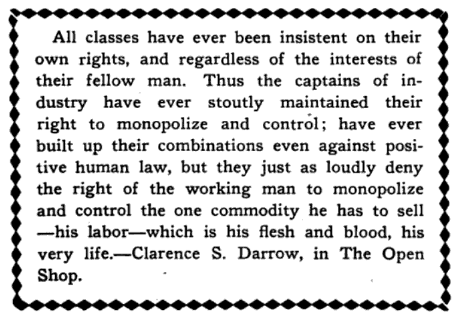 ———-
———-
Hellraisers Journal – Saturday September 4, 1909
“The Strikes in Pennsylvania” by Louis Duchez, Part II
From the International Socialist Review of September 1909:
—–
[Steel Trust Bulls and Pennsylvania Cossacks]
The steel trust “bulls” and “Pennsylvania Cossacks” were rushed in by the hundreds to club the laborers to death. One poor Hungarian while on the run was shot twenty-four times in the back. Comrade J. W. Slayton has the coat and every bullet hole shows up. The victim is lying in the hospital at the point of death. Another one, an Italian, looked through a knot hole in the fence surrounding the company’s property and two “bulls” ran out with drawn revolvers. One of them kept him covered while the other beat him so badly that he had to be dragged away by his fellow strikers and carried to the hospital. It would take volumes to relate in all its detail the brutality and boldness and lawlessness of the Pressed Steel Car Company.
It is no wonder that the country was aroused over the matter. No one with human feeling and a cent to give could refrain from offering it to the poor, starving men and children and sick women, who were treated a thousands times worse than the serfs of the Middle Ages or the black chattel slaves of the South.
In Butler the strikers were treated about the same as in McKees Rocks. Before the “Cossacks” came all was quiet, aside from the fact that the company “bulls” did everything to start a riot.
When the “Cossacks” came into town, naturally, the striking men and their families would crowd along the main streets. Hundreds of them got out in the middle of the streets of the little village of Lyndora, the Standard Steel Car Company’s town, and the mounted constabulary rushed into them without warning.
The squire of the village, a democrat, told me the story. He said they ran into the peaceful mass and began clubbing right and left. Two or three of the strikers refused to be treated in that manner and they picked up oranges and bananas at a nearby stand and threw them at the “troopers.” Then the “riot” started. Heads were falling in every direction and shots were fired. Two “Cossacks” ran their horses into a fruit store after a couple of strikers. It was positively known that the constabulary was brought to Butler to start a riot. Everything was prearranged. The company “bulls,” or guards, failed to do it alone.
In New Castle the case is similar. All was quiet. The strikers were peaceable and well disciplined. The American Tin Plate Company had done everything conceivable in order to incite riot, but failed. Finally, they struck a plan. Seventy “scabs” were sent from Cleveland. They were each given a half pint of whiskey on the train. They nearly all had revolvers. When they got off the cars at the Union depot each was handed a club and told, “If you have to go through blood, go through it.” The strike-breakers, most of them intoxicated, marched through the town, and made insulting remarks to the strikers that lined the sidewalks. One striker, it is reported, put his hand on a scab’s pocket to ascertain whether he had concealed weapons or not.
The scab struck at him and hit one of his own number, who is yet in the hospital.
The county sheriff sent at once for the “Cossacks”—stables were prepared for them two weeks previously. But neither he nor the city police nor the mayor prevented the armed men from marching through the town. In fact they did everything in order that a riot might be started. This is no secret. Every citizen in New Castle knows it.
In New Castle company “bulls”—men (?) who are neither citizens or taxpayers of the county—are sworn in as deputy sheriffs. As one of them told a striker, “I am not here to work. Do you think a man with hands like those (and he showed the palms of his hands) ever worked? I’m here to start something.”
There are strike-breakers, too, held in the tin mills of New Castle against their wills. Ignorant foreigners are brought into the mills from out of town, and once within the gates, they are kept there—unless they become too unruly. The writer saw one man who was sent into New Castle from Cleveland, struck over the head and shoulders a half dozen times by one of the “bulls,” because he hesitated to go in after being let off the train near the mill.
In McKees Rocks at the beginning of the strike there was no organization, aside from the few machinists—who refused to come out, at first, with the rest. With the different nationalities there was chaos for awhile. Priests were the first to interfere. Finally the socialists of Pittsburg came in, led by Comrade John W. Slayton, organizer for Allegheny county. Some kind of order and discipline was brought about. An executive committee was elected, and it looks, at this writing, as if the men had a good chance to win.
However, the foreigners, who compose nearly all the strikers, are suspicious of their leaders. There is a deep distrust among the McKees Rocks strikers, of the A. F. of L. and all its branches. And this distrust is well founded. In the strikes of the past eight years it was the A. F. of L. men in the mills that caused the defeat of the strikers. Certain organized departments remained at work while others-mostly unorganized—came out. And the present executive board is made up, principally, of the A. F. of L. men—those who stayed in until they were compelled to walk out because the other departments were tied up—and A. F. of L. sympathizers.
In Butler none whatever are organized. A Polish priest took charge of the situation at the beginning. Finally, he told the men that the company would give them a raise after they worked awhile—and they went back. Eighty of the leaders were victimized, evicted from their hovels, and the brand of the company has been placed upon them. Officials of the A. F. of L. were appealed to, but they did nothing. Apparently they thought the situation too grave—besides the strikers had no money to give them.
Just about this time William E. Trautman, general organizer for the Industrial Workers of the World, who had just landed in western Pennsylvania, Frank Niedzillski, a member of the first and second Russian douma from Poland, and the writer planned for a meeting in Butler. We had a crowd of 800, started an organization of about 650, and it looks as if all will be brought into one compact organization in the near future. The men feel the need of an organization where every member stands as one man.
The most prominent feature of these three strikes is the wonderful spirit of solidarity and the recognition of the need of one compact organization. The men speak of it as a “labor trust” and “one big union.” They are not troubled about the “failures” and “splits” of the I. W. W. in the past. They only know that the A. F. of L. has failed to make good; moreover, they know that wherever it interfered it divided the workers They instinctively feel that it is a capitalistic organization. On the other hand the Industrial Workers of the World represents industrial unionism.
Old “Amalgamated” men in New Castle who have been hanging to the old organization for years realize this now and they are doing all in their power to build up industrial unionism in New Castle. Already two unions of the I. W. W. have been formed in New Castle, one among the unorganized of the tin mills, with a membership of 500, and a mixed local of about 65 members. In fact, it was a group of men in the mechanical department of the Shenango tin mill in New Castle, imbued with the principles of industrial unionism, that brought the men out in that department in sympathy with the Amalgamated and Protective Association men.
Charles McKeever, an electrical engineer in the Shenango mill, and a half dozen others, for two or three weeks after the Amalgamated men came out, carried on an education in the principles of industrial unionism. These men formed the nucleus for the I. W. W. organization. Finally, when McKeever, who is an active Socialist, was handed a check by the master mechanic and told his services were no longer needed, he said: “All right,” and ran to the whistle rope and gave it a long pull. This was about 4 o’clock in the afternoon—one hour before quitting time. Every man dropped his tools, picked up his bucket, and they walked out in a body, without shutting off the engines or anything else.
A sample of the tactics of industrial unionism was given and the men learned a concrete lesson. The Free Press, the local Lawrence county Socialist paper, realizing that the workers want shop talk and shop action, was simply driven to stand out and out for industrial unionism and the I .W. W. as the only organization that represents that form of unionism.
Political action is at times an effective weapon in fighting the capitalist class, but we should not get away from the fact that the revolutionary movement of the workers is on the industrial field. Instinctively the wage slave’s mind is in the shop—judicial and legislative wranglings do not appeal to him.
Organizations of the I. W. W. are being formed in McKees Rocks, Butler, New Castle, South Sharon, Struthers and other places in and around the Pittsburgh district. W. E. Trautman, general organizer, has more dates than he can fill. The workers are ready for constructive work.
I miss my guess badly if western Pennsylvania is not going to be the storm center of the revolution. The Knights of Labor died last in this part of the country, and the industrial process is more developed here than in any other part of the United States. Now is the time, indeed, to quit wrangling and get down to doing things.
[Emphasis and paragraph breaks added.]
~~~~~~~~~~~~~~~~~~~~~~
SOURCES & IMAGES
Quote Mother Jones, Powers of Privilege, Ab Chp III
https://www.iww.org/history/library/MotherJones/autobiography/3
The International Socialist Review, Volume 10
(Chicago, Illinois)
-July 1909-June 1910
C. H. Kerr & Company, 1910
https://books.google.com/books?id=MVhIAAAAYAAJ
ISR-Sept 1909
The Strikes in Pennsylvania by Louis Duchez
https://play.google.com/books/reader?id=MVhIAAAAYAAJ&printsec=frontcover&pg=GBS.PA193
Part II
https://play.google.com/books/reader?id=MVhIAAAAYAAJ&printsec=frontcover&pg=GBS.PA199
See also:
Tag: McKees Rocks Pressed Steel Car Strike of 1909
https://weneverforget.org/tag/mckees-rocks-pressed-steel-car-strike-of-1909/
John W Slayton
https://en.wikipedia.org/wiki/John_W._Slayton
~~~~~~~~~~~~~~~~~~~~~~~~~~~~~~~~~~~~~~~~~~~~~
Which Side Are You On? – Billy Bragg
Lyrics by Florence Reese & Billy Bragg



